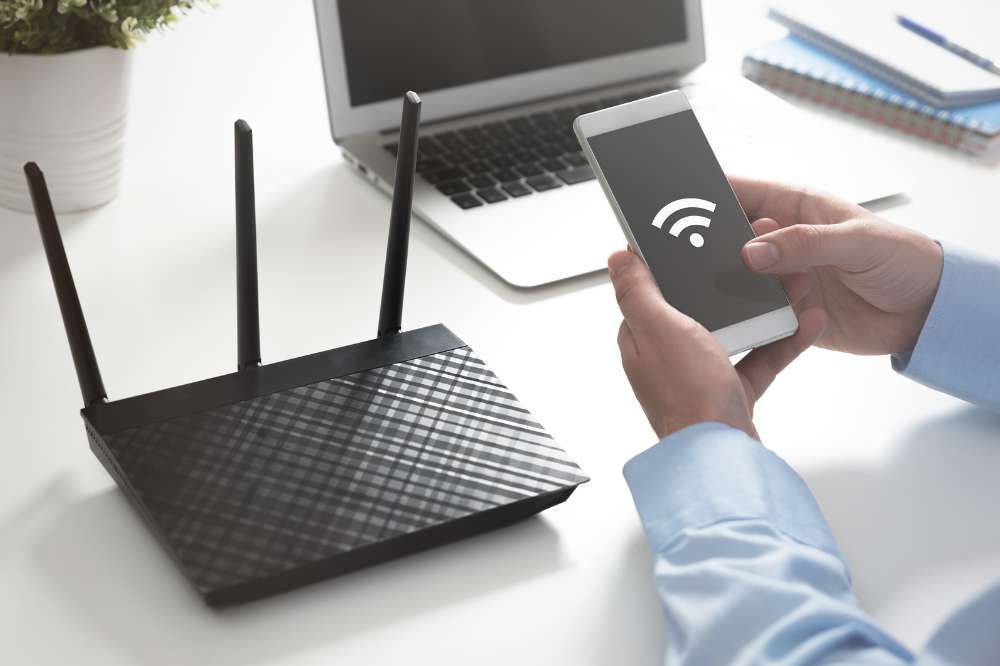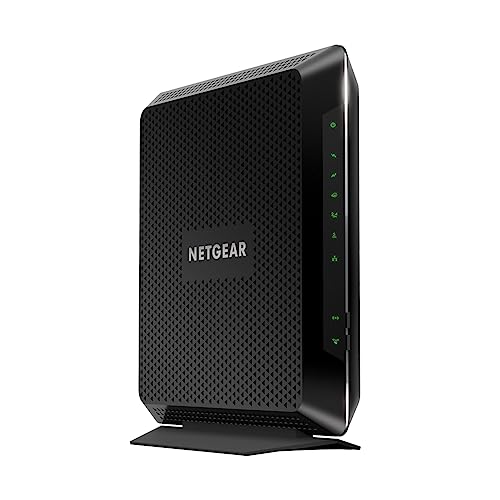In our modern, interconnected world, wireless networks have become an integral part of daily life, powering everything from home entertainment systems to corporate infrastructures.
However, with this convenience comes the critical responsibility of ensuring the security of our WiFi connections. At the forefront of this defense is wireless WiFi encryption, a vital tool in safeguarding the data transmitted over these networks.
Whether at home or in the office, understanding the significance of WiFi encryption is paramount for protecting sensitive information and maintaining digital privacy.
In this article we’re going to learn about the importance of wireless WiFi encryption, shedding light on why individuals and businesses alike must prioritize WiFi security in today’s digital landscape.
- Compatible with major cable internet providers including Xfinity, Spectrum, Cox and more. NOT compatible...
- [Compatibility] 12V Power Supply Adapter Compatible with Netgear, Linksys, Asus,Motorola, Motorola/Arris...
What is Wireless WiFi Encryption?

Wireless WiFi encryption is a security measure that encodes data transmitted between devices and WiFi access points, making it unintelligible to unauthorized parties. Encryption protocols such as WEP (Wired Equivalent Privacy), WPA (WiFi Protected Access), WPA2, and the latest standard, WPA3, are used to implement encryption on WiFi networks.
The primary purpose of wireless WiFi encryption is to protect the confidentiality and integrity of data exchanged over WiFi connections. By encrypting data, WiFi encryption prevents eavesdropping and unauthorized access to sensitive information, such as passwords, financial data, and personal communications.
Encryption protocols use cryptographic algorithms to scramble data before transmission and decrypt it upon receipt, ensuring that only authorized users with the correct encryption keys can access the information. This process provides a secure means of communication over WiFi networks, mitigating the risk of data interception and tampering by malicious actors.
Importance of Wireless WiFi Encryption for Home Users
Wireless WiFi encryption is of paramount importance for home users due to the sensitive nature of the data transmitted over residential WiFi networks. Here are several reasons why WiFi encryption is crucial for home users:
- Protection of Personal Information: Home WiFi networks often handle sensitive personal information, including financial data, login credentials, and private communications. Without encryption, this information is vulnerable to interception by cybercriminals, putting users at risk of identity theft, fraud, and privacy breaches.
- Safeguarding Family Members: In households with multiple users, each device connected to the WiFi network may transmit personal data, including children’s online activities and educational materials. WiFi encryption helps protect all users, regardless of age, by ensuring that their online interactions remain private and secure.
- Prevention of Unauthorized Access: Without encryption, home WiFi networks are susceptible to unauthorized access by individuals seeking to exploit network resources or conduct malicious activities. Encryption prevents unauthorized users from intercepting WiFi signals and gaining access to the network, reducing the risk of intrusions and cyber attacks.
- Mitigation of Neighbor Network Interference: In densely populated areas, neighboring WiFi networks may overlap, leading to interference and signal degradation. By encrypting their WiFi networks, home users can prevent unauthorized devices from connecting to their network, reducing interference and ensuring optimal performance.
- Compliance with Legal Requirements: In some jurisdictions, home users may be legally obligated to secure their WiFi networks to prevent unauthorized access and protect user privacy. Failure to implement WiFi encryption measures may result in regulatory penalties or legal consequences for homeowners.
Overall, wireless WiFi encryption is essential for home users to protect their personal information, safeguard family members, prevent unauthorized access, mitigate network interference, and comply with legal requirements.
Importance of Wireless WiFi Encryption for Office Environments
In office environments, where sensitive business data is transmitted over WiFi networks, wireless WiFi encryption is indispensable for maintaining data security and regulatory compliance. Here’s why WiFi encryption is vital for office environments:
- Protection of Confidential Business Data: Office WiFi networks often handle confidential business information, including financial records, customer data, and proprietary documents. Encryption safeguards this data from interception by unauthorized individuals or competitors, ensuring business continuity and preserving trust with stakeholders.
- Compliance with Industry Regulations: Many industries, such as healthcare, finance, and legal services, are subject to stringent regulatory requirements regarding data security and privacy. Implementing robust WiFi encryption measures helps office environments comply with industry-specific regulations, such as HIPAA (Health Insurance Portability and Accountability Act) in healthcare or GDPR (General Data Protection Regulation) in the European Union.
- Prevention of Corporate Espionage: Without adequate encryption, office WiFi networks are vulnerable to attacks by cybercriminals seeking to steal sensitive corporate information or conduct corporate espionage. Encryption mitigates the risk of data breaches and unauthorized access, safeguarding intellectual property and trade secrets from exploitation.
- Maintenance of Employee Productivity: A secure WiFi network enables employees to access company resources and collaborate effectively without fear of data compromise or unauthorized surveillance. By encrypting WiFi communications, office environments foster a productive and secure work environment, promoting employee morale and engagement.
Overall, wireless WiFi encryption is essential for office environments to protect confidential business data, comply with regulatory requirements, prevent corporate espionage, and maintain employee productivity. By prioritizing WiFi security, offices can safeguard their reputation, preserve customer trust, and avoid costly data breaches.
Risks of Unencrypted WiFi Networks
Operating a WiFi network without encryption exposes users to various security risks and vulnerabilities. Without encryption, data transmitted over the network is transmitted in plain text, making it susceptible to interception by unauthorized individuals. This opens the door to a range of potential threats, including:
- Eavesdropping: Without encryption, attackers can easily intercept and eavesdrop on data transmitted over the WiFi network. This includes sensitive information such as passwords, emails, and personal communications, putting users’ privacy at risk.
- Man-in-the-Middle Attacks: Unencrypted WiFi networks are vulnerable to man-in-the-middle (MITM) attacks, where attackers intercept and alter communication between two parties without their knowledge. This allows attackers to steal sensitive information or inject malicious content into data transmissions.
- Unauthorized Access: Unencrypted WiFi networks are susceptible to unauthorized access by attackers who can exploit security vulnerabilities to gain entry into the network. Once inside, attackers can launch further attacks, compromise devices, and steal valuable data.
- Data Tampering: Attackers can modify or tamper with data transmitted over unencrypted WiFi networks, leading to data integrity issues and potential security breaches. This can have serious consequences for individuals and organizations, including financial loss and reputational damage.
By understanding the risks associated with unencrypted WiFi networks, you can take proactive steps to secure your wireless connections and protect your data from exploitation.
Best Practices for Implementing Wireless WiFi Encryption
To maximize the effectiveness of wireless WiFi encryption, you should follow best practices for implementation and configuration. Some key recommendations include:
- Use Strong Encryption Protocols: Choose strong encryption protocols such as WPA2 or WPA3 to protect WiFi networks against unauthorized access and data interception. Avoid outdated and insecure protocols such as WEP, which are vulnerable to exploitation.
- Secure Passwords: Use strong, unique passwords for WiFi networks and encryption keys to prevent unauthorized access. Avoid using default or easily guessable passwords, as these can be easily compromised by attackers.
- Regularly Update Firmware: Keep WiFi routers and access points up to date by installing the latest firmware updates and security patches. Regular updates help address known vulnerabilities and strengthen the overall security of the network.
- Segment WiFi Networks: Segment WiFi networks to isolate sensitive devices and data from potential threats. Use separate networks for guests, IoT devices, and administrative purposes to minimize the risk of unauthorized access and data breaches.
- Monitor Network Activity: Monitor WiFi network activity for signs of unauthorized access, suspicious behavior, or security breaches. Implement intrusion detection and prevention systems to detect and respond to potential threats in real-time.
By following these best practices, you can enhance the security of your wireless WiFi networks and reduce the risk of security incidents and data breaches. Implementing strong encryption and adopting security measures helps protect sensitive information and maintain the integrity of WiFi communications.
Conclusion: Ensuring Secure Wireless Networks
Securing wireless WiFi networks is vital for both home and office environments. Encryption protocols like WPA3 offer crucial protection against unauthorized access and cyber threats. By regularly updating encryption settings and firmware, you can mitigate risks and maintain network security.
Let’s remain vigilant and proactive in safeguarding our wireless networks for a more secure online experience.
Thank you for exploring the importance of wireless WiFi encryption with us. We hope this article has empowered you to take steps to secure your networks effectively.





